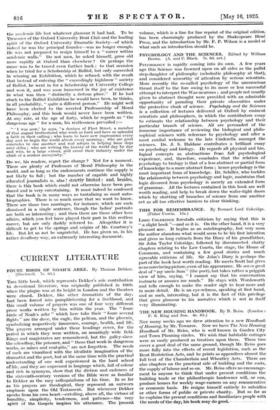PSYCHOLOGY is rapidly coming into its own. A few years
ago this Science was frowned upon on all sides as the pallid step-daughter of philosophy (scholastic philosophy at that), and considered unworthy of attention by serious scientists.
More recently the so-called psychology of the unconscious thrust itself to the fore owing to its more or less successful attempt to interpret the War-neuroses ; and people not usually given to abstract thought were provided with an admirable opportunity of parading their private obscenities under the protective cloak of science. Psychology and the Sciences
is a collection of lectures delivered at Oxford by eminent scientists and philosophers, in which the contributors essay to estimate the relationship between psychology and their particular branch of science. All are persuaded of the immense importance of reviewing the biological and philo- sophical sciences with reference to psychology and offer a most cordial welcome to the late Cinderella amongst the sciences. Dr. J. S. Haldane contributes a brilliant essay on psychology and biology. He regards all physical and bio- logical concepts as abstractions from full psychological experience, and, therefore, concludes that the relation of psychology to biology is that of a less abstract or partial form of knowledge to a more abstract form ; hence psychology is the most important form of knowledge. Dr. Schiller, who tackles the relationship between psychology and logic, maintains that logic divorced from psychology is merely an extended form of grammar. All the lectures contained in this book are well worth reading, and help to break down the wafer-tight doors
which by shutting off branches of science from one another act as all too effective barriers to clear thinking.










































 Previous page
Previous page